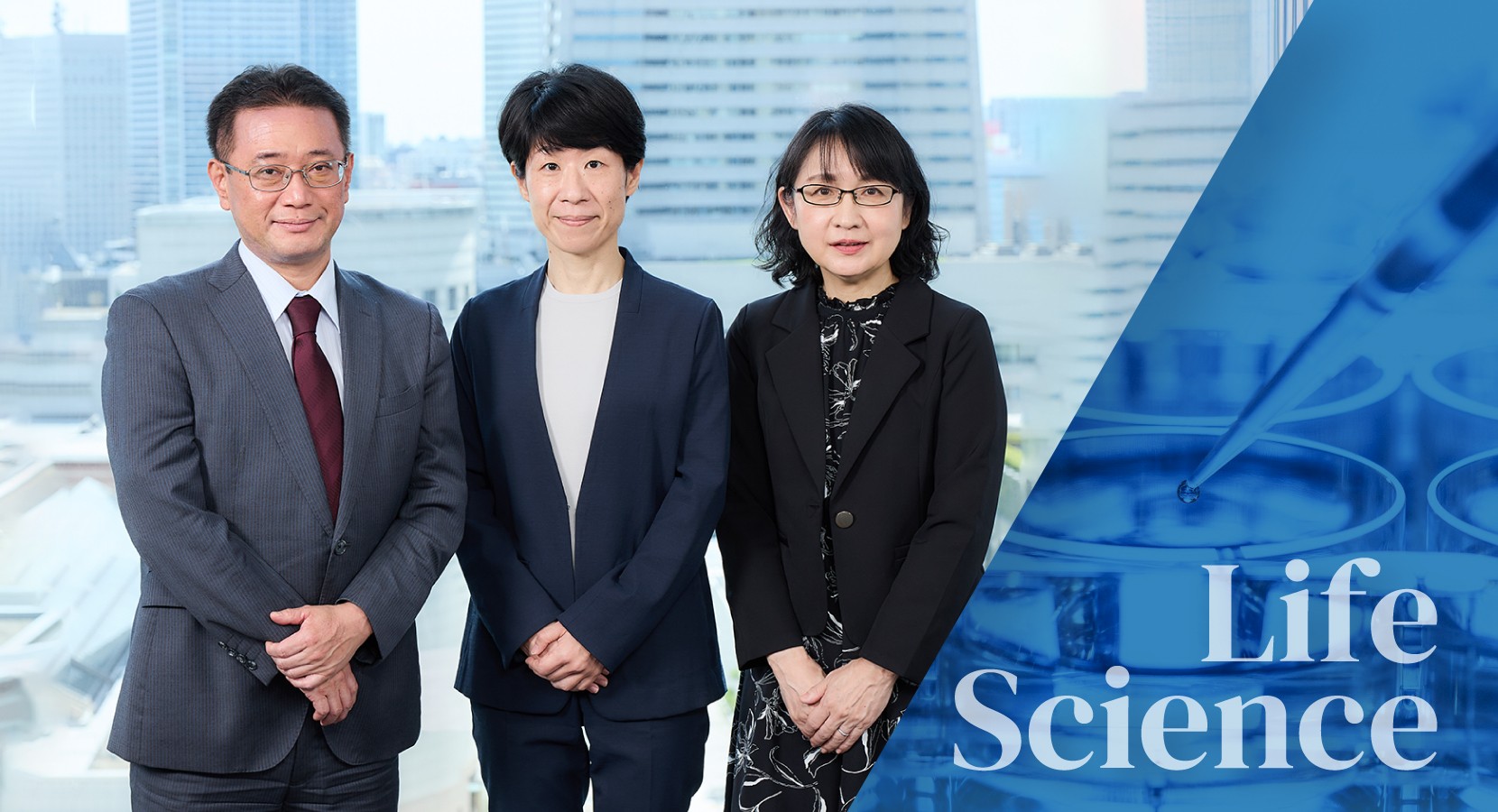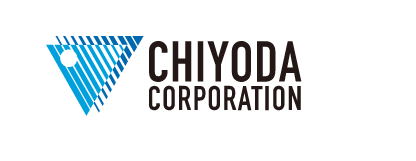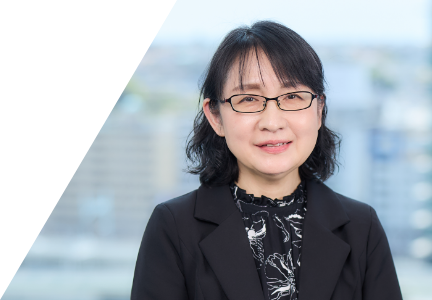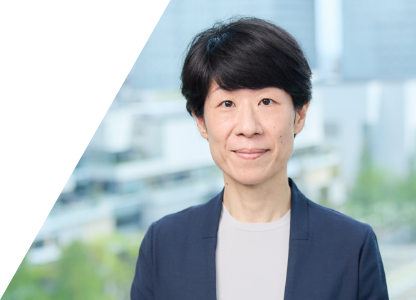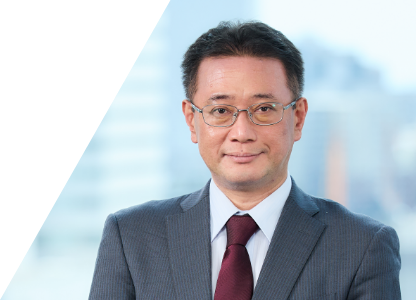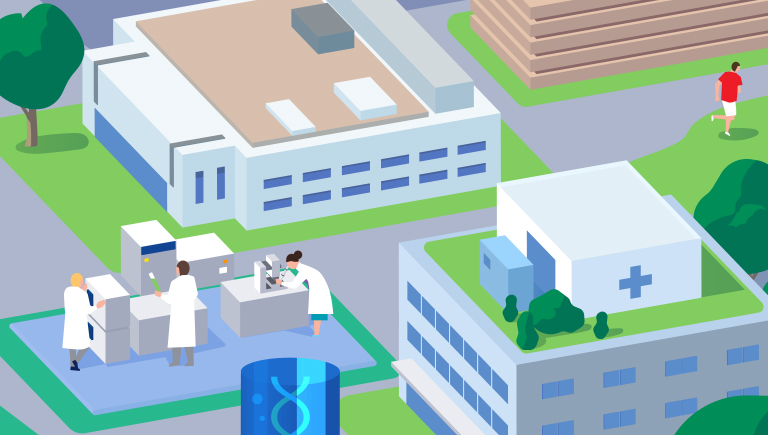
Our Growth Strategy and Resolving Society’s Challenges.
──Please tell us about the lead up to the launch of new business in the life science field.
Nishida
Chiyoda has been engaged primarily in the energy infrastructure sector for many years, offering engineering, procurement and construction (EPC) services. The Frontier Business Department was established to strengthen the EPC business and to provide new systems and solutions that contribute to solving various social challenges by utilizing engineering expertise. The life science field was positioned as a growth strategy contributing to the realization of a sustainable and healthy society. Chiyoda has been involved in the EPC business for pharmaceutical facilities since 1963 and has consistently generated stable profits. We contribute to solving social challenges in the pharmaceutical field by leveraging our strengths and expertise gained through our EPC activities.
Nomi
The EPC business involves engineering and constructing facilities while optimizing the design of internal equipment and machinery based on an understanding of the user's processes. Chiyoda provides comprehensive support services to ensure the overall optimization in our EPC businesses, and this expertise can be applied to new businesses.
Nishida
We have been providing services in our services, such as reviewing customer technical specifications and design documentation during the early design phase. Although, our approach has been primarily focused on securing EPC contracts for plant projects, providing those services has value, so monetizing them becomes new businesses to complement our EPC businesses.
Ito
The life science field is extremely complex and diverse, and many challenges become apparent prior to the EPC phase. That's where our expertise and experience become strengths.

──How do you envision being involved?
Nomi
We would like to be involved in the process of developing drugs from the initial stages in pharmaceutical or venture company laboratories. We will provide Technical Consulting from the initial research and development stage when it is common for researchers to purchase reagents “for research use only” and manually culture cells without automated or mechanized culture equipment. However, applying this approach becomes challenging when it comes to mass production. We therefore propose a, “Let's determine goal-oriented manufacturing methods and conditions” perspective and offer technology consulting services with the main focus on the sample a customer is handling and the intended product characteristics.
Ito
If the process is simply about constructing facilities based on specifications and design drawings, there won't be much to differentiate our company from our competitors. However, if we provide support from the early stage of specification development and design before EPC, we will efficiently bridge the gap between stakeholders and rapidly reaching the EPC phase.
Nomi
It is essential for us to have our own technical expertise. We need to accurately understand what challenges our customers face and offer wide ranging solutions.
Chiyoda’s Technology Consultation
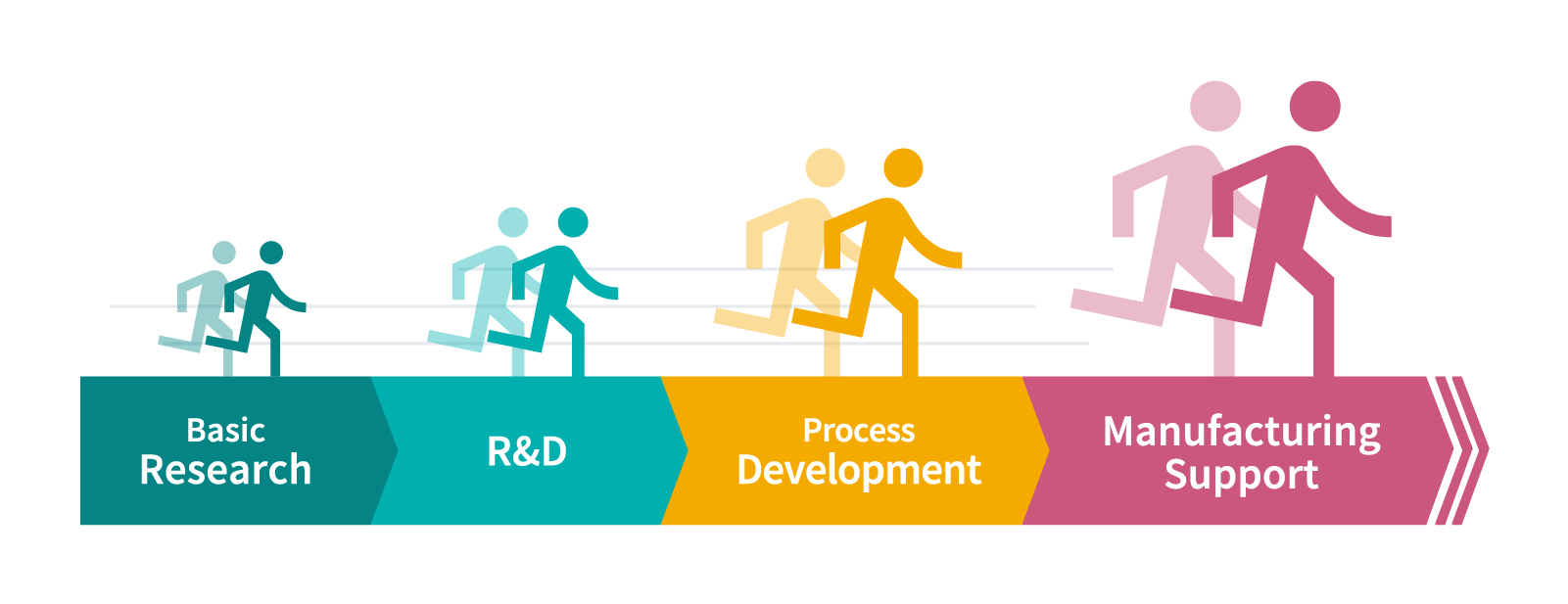

Leveraging Connections with Academia to Implement Technology into Society.
──What types of partners can be considered for co-creation?
Nomi
We collaborate start-up companies and academia in cell therapy field. Although this takes time in a new business we have been able to leverage the network of Tsukuba University through Mr. Ito and have conducted discussions with professors aware of our technical capabilities through word-of-mouth.
Ito
Having a presence in academia is significant as it provides valuable information and insights. However, simply acquiring cutting-edge technology from academia is insufficient to be a valuable partner. We need to demonstrate our own research capabilities to persuade potential partners to work with us. It is a high hurdle, but if we can achieve it, we can conduct agile research that is responsive to the needs of industry.
──How did you become involved Mr. Ito?
Ito
I first came into contact with Chiyoda in the 1990s while involved in NASA's space program. Mr. Koichi Wakata was simultaneously conducting cell culture experiments on the International Space Station and I was working on control experiments on the ground. Chiyoda was engaged in space environment utilization/Development Technology, developing and providing experimental equipment for life sciences, such as cell culture and plant growth, on the station.
An ambition of mine was to research the implementation of technology into society. I consulted with Chiyoda, with whom I had been conducting joint research when I was in my previous job while Chiyoda was aiming to establish life sciences a new pillar of their business.
Technology is valuable when it is used appropriately, and I wanted to join a company that would consider the proper timing, process and application of technology. That was the deciding factor for me.

──Can you please tell us about the projects you are currently promoting?
Nomi
We are promoting Contract Development and Manufacturing Organization (CDMO) and biofoundry projects. Whether plants, microorganisms or animal cells, we initially focus on understanding the process of utilizing them to create something.
Nishida
I am involved in the development of a plant biofoundry, a relatively new field compared to the utilization of microbes and mammalian cells, and one which faces industrialization challenges. One of these is the lack of domestic demonstration infrastructure to confirm the feasibility of large-scale production. We readily tackle this challenge and already have clients who are interested and rely on us for this purpose.
Nomi
The ‘Development of Plant-Based High-Yield Protein Production Technology’ is a collaboration initiative with the National Institute of Advanced Industrial Science and Technology (AIST), Osaka University, and Nippi Inc., selected for the NEDO grant project ‘Development of Biobased Production Technologies to Accelerate the Realization of Carbon Recycling’ aimed at scaling up technology. We are essentially engaged in a development-type Original Equipment Manufacturer (OEM) approach.
Nishida
We are also working on a large-scale manufacturing system for recombinant proteins in plants and are planning to construct a validation facility on the vacant land at Chiyoda’s Koyasu Research Park to facilitate the scale-up process. Simply having facilities in place is insufficient to expand our services. It is crucial to identify key points of the technology and anticipate potential challenges early, accumulating expertise to adequately support our clients.
Implementing a NEDO Subsidy Project
<Development Outline>
Chiyoda selected a demonstration model product requiring intracellular modifications after translation with a complex structure to develop a production process using plants with transient expression system-based genetic recombination technology.
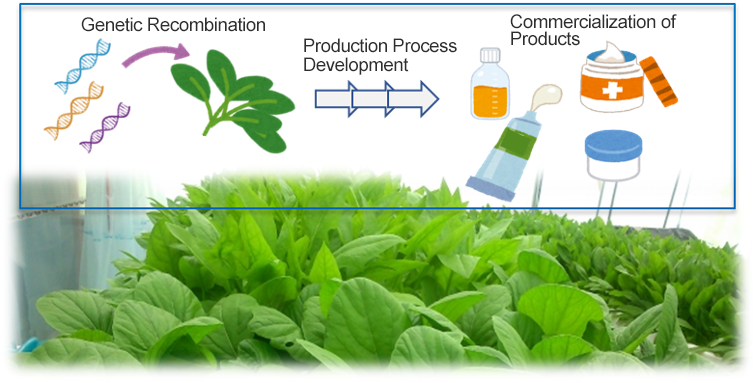
- We plan to construct a pilot plant as a ‘Plant Biofoundry’ to demonstrate product production within our Koyasu Research Park by the end of FY2024.
──Please tell us about the business model you are aiming for.
Ito
The aim is monetize any stage through the entire process from development to construction.
Nomi
The route to be followed is determined at the process entry point, ie: the types of microorganisms or cells to be used, and at the exit point, ie: what ultimately needs to be produced. That's why our technical expertise in providing customized proposals that align with client objectives is key.
Nishida
We have been approached by clients who were already in the commercialization phase and ready to construct a facility. However, our aim is for clients to consider consulting Chiyoda at an earlier stage.

A Sustainable Company that Commercializes Technologies Contributing to Society
──Can you please tell us about your future roadmap and prospects?
Nishida
In the plant biofoundry field, we will first work on the NEDO project I mentioned earlier until June 2025, after which we will commercialize projects proposed to us by clients. We aim to have a plan in place by 2025, start providing services in 2026 and achieve profitability before 2030.
Nomi
In the CDMO field, we are focusing on both regenerative medicine cell-based drugs and polymer-based drugs. While the market for polymer-based drugs is more mature, the market for regenerative and cell-based drugs is in the process of growing, so we are aiming to commercialize our business with an eye on each.
Ito
It is crucial to look beyond achieving profitability. While there may be potential for an initiative to become a business in the development stage, it’s growth potential is a separate issue. We will achieve sustained growth and contribute to society by consistently generating profits from existing businesses and simultaneously preparing for future opportunities, involving the intelligence and capabilities to constantly adapt to new opportunities and monetize them.
──Lastly, please share your perspectives on Chiyoda’s mission in the life science field and what you believe it should accomplish.
Nomi
While the development of pharmaceuticals varies depending on their application, there are common approaches and experiences that can be applied. Therefore, it may be more efficient to support development primarily by developers who understand the characteristics of the drug under development, with experts in the field around them on a project-by-project basis.
Ito
My main guiding principle is to improve the quality of life (QOL) for vulnerable demographics such as children and the elderly through widely accessible technological advancements. Creating processes that anticipate mass production is important in that regard.
Nishida
I have experience in the EPC businesses, and I understand the challenges of launching new businesses in unfamiliar fields. Chiyoda is a unique organization and agree with Mr. Ito that technology has value only when it is implemented in society and serves a purpose. I believe that this principle is valid in both EPC and new businesses.
──Implementing technologies contributing to society, regardless of the field, will lead to further growth. Thank you very much for today's discussion.



